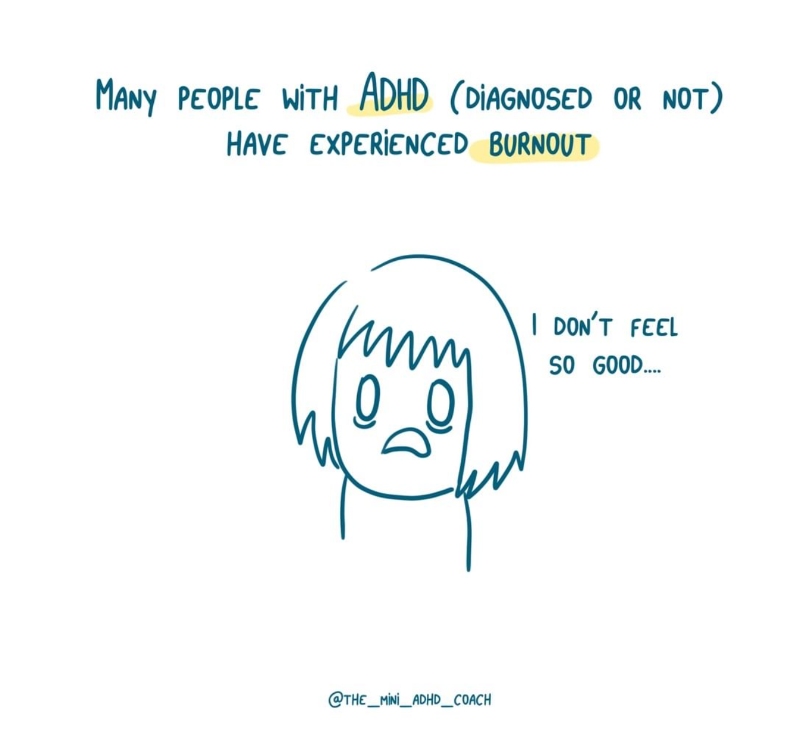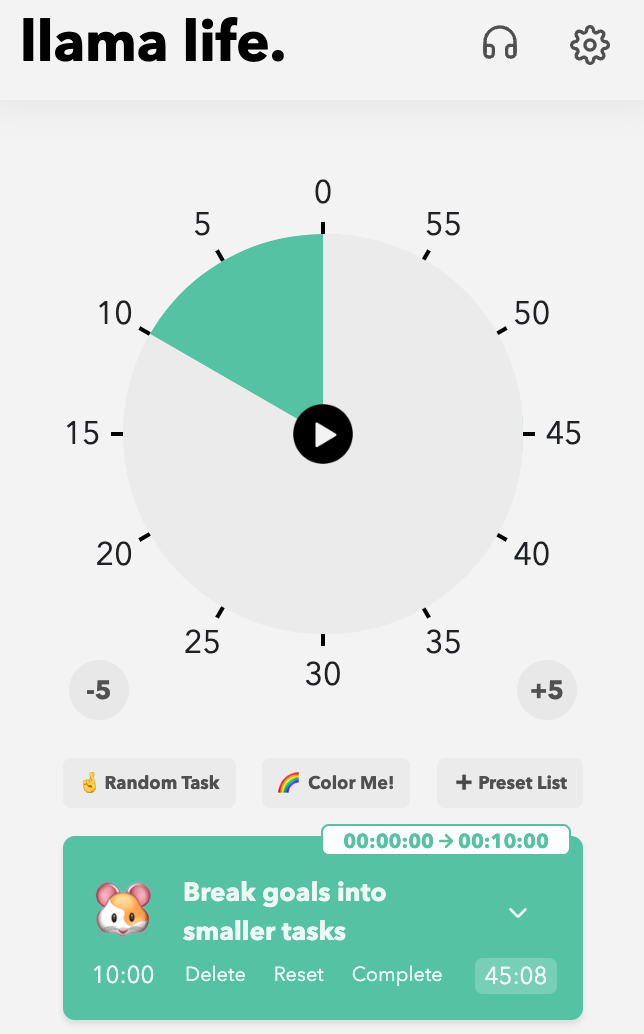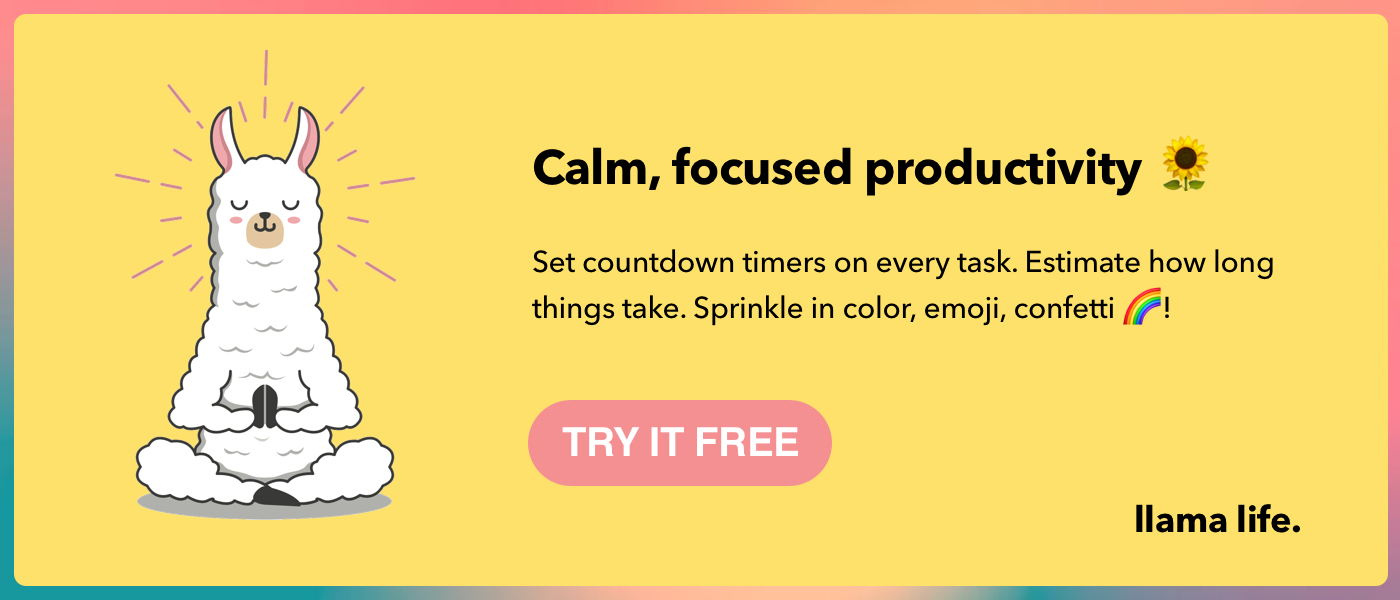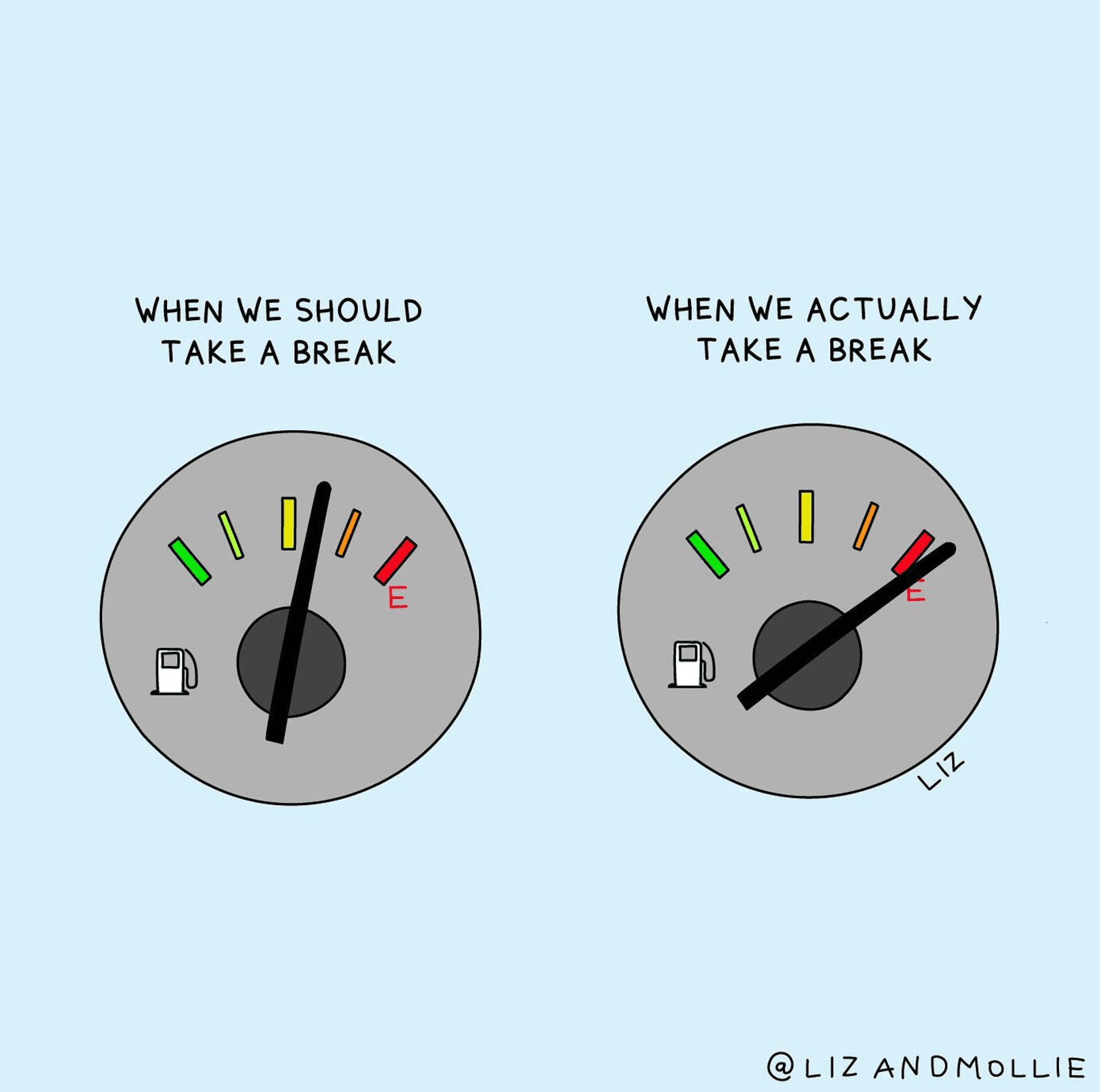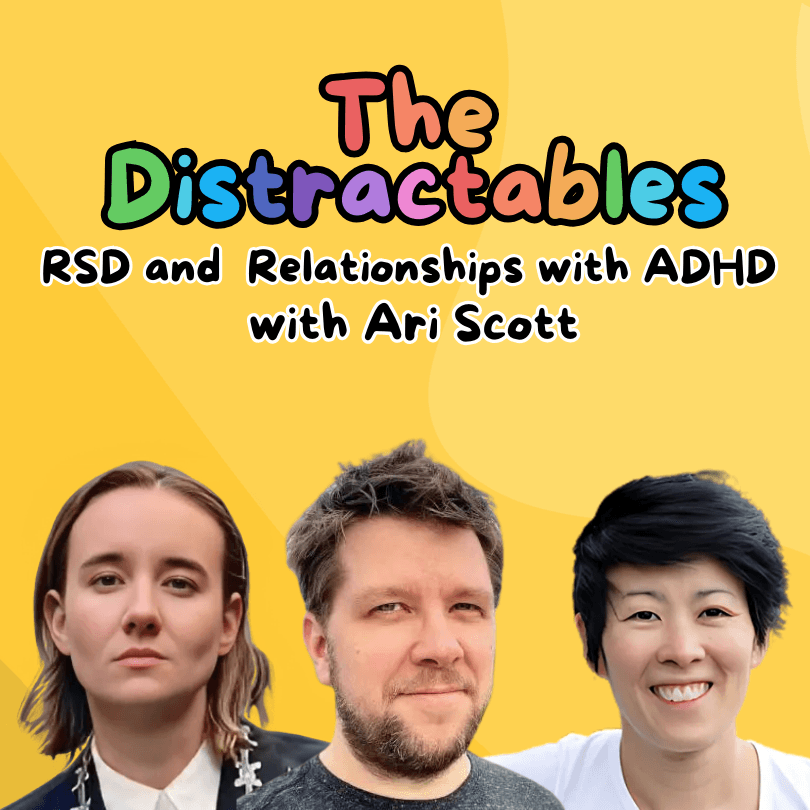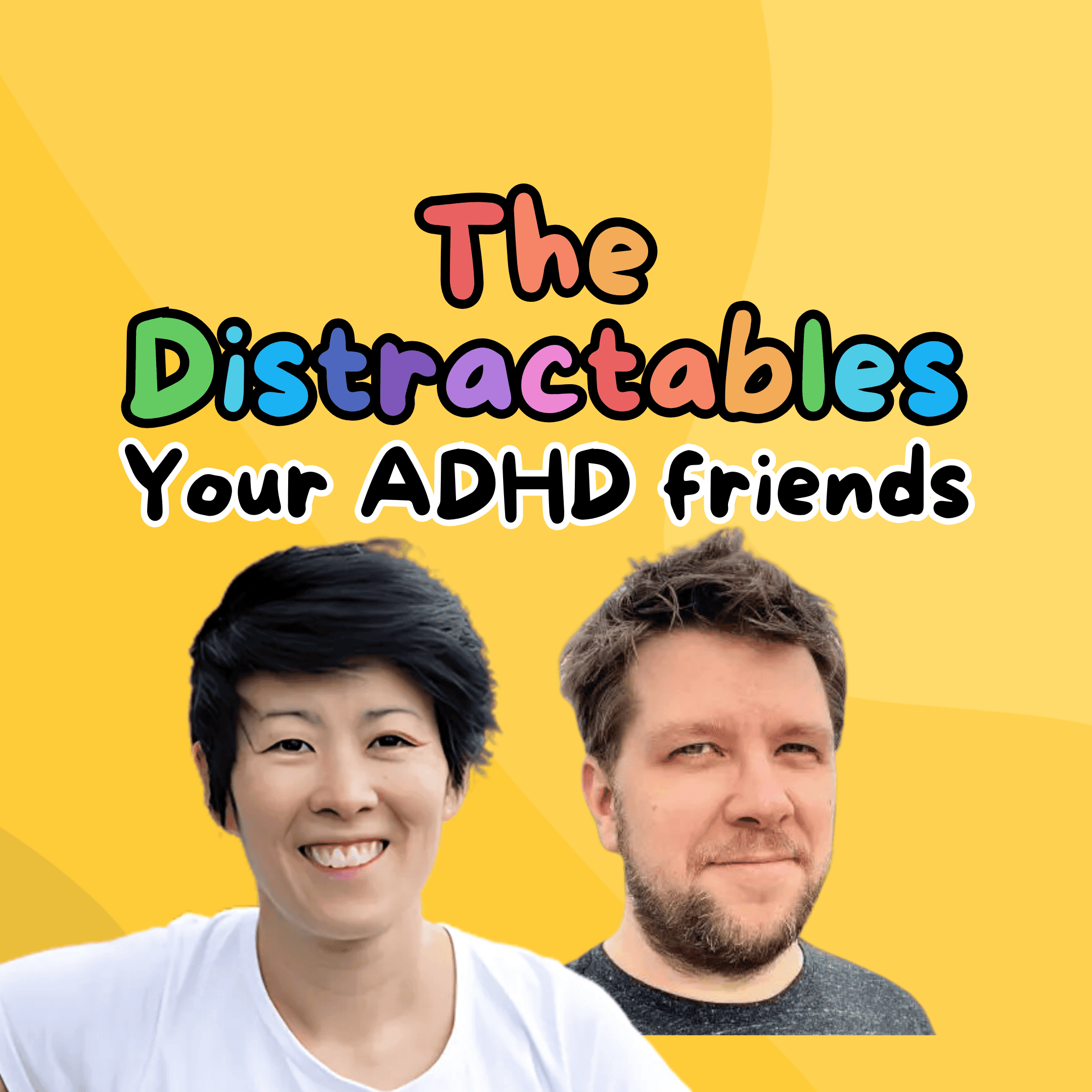Amidst the chaos of the mind, a storm brews, unseen and often misunderstood. It is the realm of Attention Deficit Hyperactivity Disorder (ADHD) burnout, where the ceaseless demands clash with limited mental and emotional resilience.
ADHD burnout is no passing phase; it can greatly disrupt your quality of life. It brings forth mental fatigue, loss of motivation, and an uphill battle to maintain focus and productivity, resulting in mental exhaustion. Emotionally, it can bring on intense feelings of frustration, shame, and self-doubt, leaving ADHDers yearning for understanding.
In this article, we'll shed light on the signs of burnout, how to prevent burnout, it's challenges, strategies, and pathways to recovery.
Source: The Mini ADHD Coach
Adult ADHD and burnout
Adult ADHD burnout is an overwhelming state of mental and emotional exhaustion experienced by individuals with ADHD. It occurs when the persistent challenges and demands associated with ADHD, such as difficulty with organization, time management, and sustaining focus, become excessively burdensome over time.
Adult ADHD burnout can manifest as a profound loss of motivation, decreased productivity, increased distractibility, heightened emotional reactivity, and a pervasive sense of overwhelm. It is often accompanied by feelings of frustration, self-doubt, and a reduced sense of self-worth. This state of burnout can significantly impact various aspects of an individual's life, including work, relationships, and overall well-being.
Why adult ADHDers are more prone to experience burnout
People with ADHD are at a greater risk of burnout due to several factors inherent to the condition. First and foremost, individuals with ADHD often have difficulties with executive functions (executive dysfunction), which are responsible for planning, organizing, and managing tasks. This can lead to chronic disorganization, time management challenges (such as time blindness), and an increased likelihood of taking on more than they can handle.
Moreover, the constant struggle to maintain focus and sustain attention can be mentally exhausting and cause additional stress. People with ADHD frequently face an ongoing battle against distractions, making it harder for them to stay on task and meet deadlines. This can result in further stress and frustration as they try to keep up with the demands of daily life.
Additionally, the experience of living with ADHD can be emotionally taxing. Individuals may grapple with feelings of inadequacy, shame, and self-criticism due to difficulties in meeting expectations or societal norms. The need to constantly compensate for their unique cognitive style can create a perpetual sense of pressure and unease.
Furthermore, the relentless efforts to mask or hide ADHD symptoms in social and professional settings can contribute to burnout. This constant vigilance and the fear of being judged or misunderstood can be emotionally draining over time.
Prevention is better than recovery - strategies to prevent ADHD burnout
"Preventing burnout is easier than recovering from burnout. But, they are both hard!" - Meredith Carder , ADHD Coach - Hummingbird_ADHD
Avoiding burnout is possible, even for individuals with ADHD! Having ADHD does not automatically mean experiencing burnouts. Here are some tips to help you prevent burnout:
- Recognize that you are human and have limits: Acknowledge that you cannot do everything, particularly all at once. The pressure of overwhelming tasks can impact our mental well-being and make us feel out of control. Engaging in open communication with your team members about workload can be beneficial in managing burnout at work.
- Embrace regular breaks: Do not hesitate to take regularly breaks. Resting is essential for everyone, including yourself. Avoid overworking yourself which only adds further stress. Instead, allocate significant periods of time for self-care, rest, and breaks to combat ADHD fatigue.
- Discover relaxation techniques: Even though ADHD and relaxation may not seem compatible due to hyperactive thoughts, try to find ways to relax your mind. Explore activities that promote relaxation, such as listening to your favorite music, practicing yoga, or making sure you spend time outside everyday.
- Learn how to manage pressure mindfully: Pressure can be deceptive, especially when our ADHD brains come into play. While it may be challenging, make an effort to redirect your thoughts and alleviate unnecessary pressure
ADHD burnout: Common ways it can manifest
ADHD burnout can manifest in various ways, and the specific scenarios can differ based on individual experiences. Here are a few examples of what ADHD burnout might look like for you:
- Work-related burnout: A person with ADHD may struggle to keep up with deadlines and responsibilities at work. They may constantly feel overwhelmed by their workload, have difficulty prioritizing tasks, and experience a lack of motivation or focus. This can result in missed deadlines, decreased productivity, and heightened anxiety as they struggle to meet expectations.
Social burnout: People with ADHD may face social burnout due to the constant efforts to mask their symptoms and fit into social situations. They may feel mentally exhausted from trying to maintain focus during conversations, keep up with social cues, or suppress impulsive behaviors. This can result in social withdrawal, feelings of isolation, and a decreased desire to engage in social activities.
Academic burnout: Students with ADHD may find it challenging to stay organized, manage their time effectively, and maintain concentration on studying. They may feel overwhelmed by the academic demands of coursework, experience frequent forgetfulness, and have difficulty completing assignments or studying for exams. This can lead to a sense of academic failure, frustration, and a loss of interest in learning.
- Personal burnout: On a personal level, individuals with ADHD may struggle with self-care and managing daily responsibilities. They may feel overwhelmed by simple tasks such as maintaining a clean living space, managing finances, or sticking to a routine. This can lead to a sense of disorganization, self-neglect, and a feeling of being constantly behind or overwhelmed.
- Emotional burnout: The intense emotional rollercoaster that often accompanies ADHD can contribute to emotional burnout. ADHDers may experience frequent mood swings, difficulty regulating emotions, and a heightened sense of frustration or irritability. This emotional exhaustion can impact relationships, self-esteem, and overall well-being.
It's important to note that these scenarios are not exhaustive and can vary greatly from person to person. ADHD burnout is a complex and multifaceted experience that encompasses a range of challenges and impacts various areas of life.
How to recognize the signs and symptoms of burnout
Recognizing the common symptoms and signs of ADHD burnout is crucial in identifying and addressing this state of exhaustion. While individual experiences may vary, here are some common signs that may indicate you're experiencing ADHD burnout:
- Persistent mental fatigue: A common burnout symptom where you consistently feel mentally exhausted, even after getting adequate rest. Simple daily life tasks that used to be manageable become mentally draining, requiring significant effort and concentration.
- Decreased motivation: A notable decrease in motivation and drive may result in feelings of burnout. You find it challenging to initiate and sustain daily tasks, feeling a lack of enthusiasm or interest in activities that used to engage you.
- Difficulty with focus and concentration: You struggle to maintain focus and concentration on tasks. Your mind wanders more frequently, and you may find it harder to stay on track or complete assignments within deadlines.
- Reduced productivity: Despite your best efforts, your productivity levels decline. You may feel overwhelmed by your workload and experience difficulties in organizing and completing tasks efficiently.
- Emotional exhaustion: You may experience heightened emotional reactivity, feeling more irritable, frustrated, or overwhelmed by everyday situations. Emotionally charged situations may trigger stronger reactions than usual.
- Increased forgetfulness and disorganization: Memory lapses and disorganization become more prevalent. You may frequently forget appointments, deadlines, or where you placed important items. Your usual strategies for organization may feel less effective.
- Physical symptoms: Burnout can manifest in physical symptoms such as headaches, muscle tension, sleep disturbances, or a compromised immune system. Chronic stress associated with ADHD burnout can affect your overall well-being.
- Impaired self-esteem: ADHD burnout can negatively impact self-esteem and self-worth. You may experience self-doubt, feelings of inadequacy, and a sense of failure due to struggles in meeting expectations or accomplishing tasks.
- Social withdrawal: Feeling overwhelmed by the demands of daily life, you may withdraw from social activities or isolate yourself to conserve energy. Interacting with others may feel draining, leading to a decreased desire for social engagement.
- Heightened anxiety or depression: ADHD burnout can contribute to increased anxiety or depressive symptoms. The ongoing struggle to keep up with demands and the frustration of not meeting personal or societal expectations can take a toll on mental health.
- Changes in appetite and sleep patterns: Burnout can disrupt your eating and sleeping routines. You may experience changes such as decreased appetite or overeating, as well as difficulties falling asleep or staying asleep due to racing thoughts or worries.
- Disrupted daily routines: Your usual routines and habits may become disrupted or neglected. You might struggle to maintain a consistent schedule, find it challenging to adhere to regular self-care activities, or feel overwhelmed by the demands of daily life.
- Altered communication about work or daily activities: You may notice changes in how you talk about your day or work. Conversations that used to be filled with enthusiasm and positivity might be replaced by more negative or apathetic language. You may find yourself frequently expressing frustration, fatigue, or a lack of fulfilment in your work or daily responsibilities.
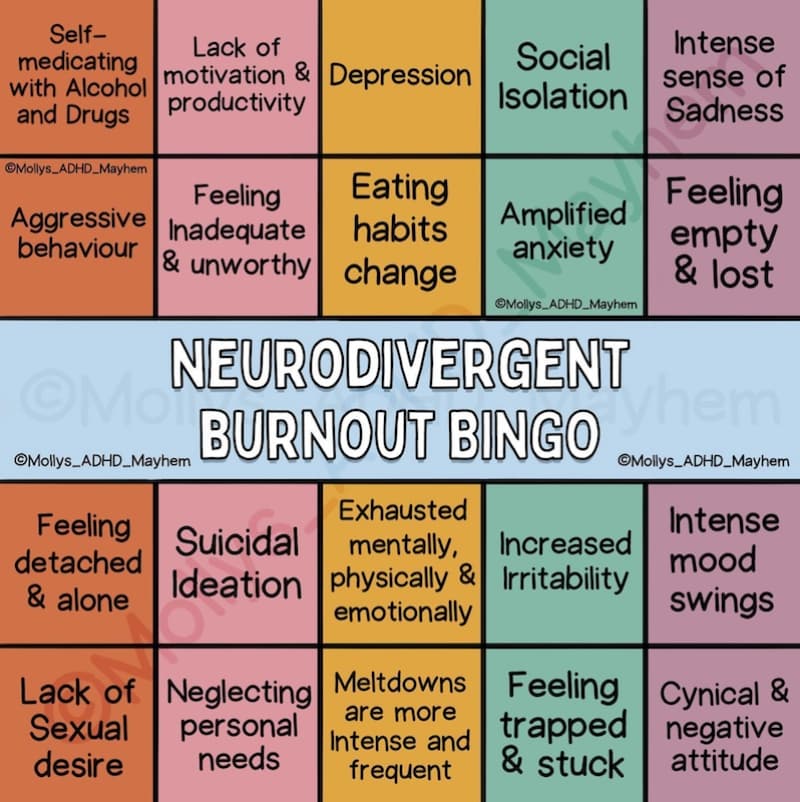
Source: Molly's_ADHD_Mayhem
If you notice several of these signs persisting over a prolonged period and interfering with your daily functioning and well-being, it may be an indication that you're experiencing ADHD burnout. It's important to reach out for support, whether from healthcare professionals, support groups, or loved ones, to develop coping strategies and work towards recovery.
What can cause ADHD burnout?
ADHD burnout can be caused by a combination of factors. Here are some common contributors:
Imposter syndrome: Imposter syndrome refers to the persistent belief that you are not as competent or capable as others perceive you to be. Individuals with ADHD may experience imposter syndrome due to their challenges with executive functions and the perception that they are constantly falling short of societal or professional expectations. The constant self-doubt and fear of being exposed as inadequate can contribute to chronic stress and emotional exhaustion.
Increased irritability: ADHD can lead to difficulties in emotional regulation, and chronic stress and overwhelm can exacerbate irritability. Constantly dealing with the challenges associated with ADHD, such as forgetfulness, disorganization, and difficulty with focus, can create a sense of frustration and heightened emotional reactivity. This increased irritability can further contribute to burnout and strain relationships.
Overcommitting: Many individuals with ADHD have a tendency to overcommit and take on more tasks or responsibilities than they can handle. They may struggle to accurately assess their capacity and have difficulty saying no, and a tendency for people pleasing. This chronic pattern of overcommitting can lead to an overwhelming workload, increased stress, and a diminished ability to meet expectations, ultimately contributing to burnout.
ADHD freeze: The ADHD freeze refers to a state of mental paralysis or being "stuck" due to overwhelming tasks, decision-making, or uncertainty. When faced with a complex or demanding situation, individuals with ADHD may experience a heightened sense of anxiety and find it challenging to initiate action or make decisions. This freeze can lead to procrastination, a sense of being overwhelmed, and a buildup of tasks, contributing to burnout over time.
Tips to manage burnout
Navigating the intricate landscape of ADHD burnout requires resilience, self-awareness, and a toolkit of effective and actionable strategies. In the midst of mental and emotional exhaustion, it becomes essential to explore methods that can alleviate the overwhelming burden, and help with future burnouts.
Question the roots of burnout: Reflect on the underlying causes and triggers of your burnout. Understanding what aspects of your life contribute to burnout can help you make targeted changes and seek appropriate support.
- Stop trying to multitask, for good!: Multitasking can be particularly challenging for individuals with ADHD. Instead, focus on one task at a time, breaking it down into smaller, manageable steps. Prioritize tasks and complete them sequentially.
- Set clear boundaries: Learn to set boundaries and prioritize your well-being. Say no to additional commitments or tasks when you feel overwhelmed, and communicate your limitations to others. You can create a positive impact by protecting your time and energy.
- Get more and better quality sleep: Establish a consistent sleep routine and create a sleep-friendly environment. Avoid stimulating activities before bedtime, limit exposure to screens, and practice relaxation techniques to improve the quality and quantity of your sleep.
- Do things that spark joy: Engage in activities that bring you joy and recharge your energy. Find hobbies, interests, or creative outlets that allow you to relax and experience a sense of accomplishment outside of your daily responsibilities.
- Practice calming techniques and exercises : Incorporate calming exercises into your routine to reduce stress and promote relaxation. This can include deep breathing exercises, meditation, mindfulness, or engaging in activities like yoga or tai chi - these activities activate the parasympathetic nervous system which can greatly aid in your recovery from ADHD burnout.

Source: Neurodivergent Insights
Practice self-compassion: Be kind and understanding to yourself. Acknowledge your strengths, accept your limitations, and treat yourself with compassion. Avoid self-criticism and negative self-talk, instead focusing on self-care and nurturing your well-being.
Remember, managing ADHD burnout is an ongoing process, and it's essential to tailor strategies to your individual needs. Don't hesitate to seek professional guidance from therapists or coaches specializing in ADHD to develop a personalized approach that addresses your specific challenges.
Focus on self-care to help your recovery from burnout

Source: Iulia Bochis
Recovering from ADHD burnout requires a multifaceted approach and a commitment to self-care. Here are some further steps to consider:
- Seek professional support: Consult with a healthcare professional, therapist, or ADHD coach who can provide guidance and support tailored to your specific needs. They can help you develop coping strategies, explore medication options if necessary, and address any underlying mental health concerns.
- Prioritize self-care: Make self-care a non-negotiable part of your routine. Prioritize activities that replenish your energy and promote well-being, such as exercise, proper nutrition, sufficient sleep, and engaging in hobbies or activities that bring you joy.
- Reevaluate and adjust: Reflect on your current commitments and responsibilities on a daily basis. Identify areas where you may be overextended and consider making adjustments. This could involve renegotiating expectations, delegating tasks, or reevaluating your workload to create a more sustainable balance.
- Practice stress management: Implement stress management techniques to help regulate and reduce stress levels. This can include mindfulness exercises, relaxation techniques, journaling, or engaging in activities that promote relaxation and calmness such as yoga.
- Build support systems: Surround yourself with a supportive network of family, friends, or support groups who understand and empathize with your challenges. Spending time with people who share similar experiences can provide validation, encouragement, and a sense of belonging.
- Develop coping strategies: Identifying and developing coping strategies that work for you can make a huge difference. This might include breaking tasks into smaller, manageable steps (with tools like Llama Life), using visual aids or reminders, implementing time management techniques, or utilizing organizational tools to enhance productivity and reduce overwhelm.
Source: Llama Life
- Set realistic goals: Set realistic and achievable goals for yourself. Break larger tasks into smaller, more manageable milestones, and celebrate each accomplishment along the way. By setting achievable goals, you can rebuild confidence and motivation.
- Practice self-compassion: Be gentle and compassionate with yourself throughout the recovery process. Recognize that burnout is not a personal failing, but a consequence of the challenges posed by ADHD. Practice self-acceptance, celebrate progress, and embrace self-care as an essential part of your journey.
Remember, recovery from ADHD burnout is a gradual process that requires patience and perseverance. Each step taken towards self-care and well-being contributes to building resilience and reclaiming a sense of balance and fulfilment.
Let's recap
In summary, ADHD burnout is a state of mental and emotional exhaustion experienced by individuals with ADHD.
- It disrupts focus, organization, and productivity, and can lead to feelings of frustration, shame, and self-doubt
- Factors such as executive function difficulties, constant distractions, and emotional tolls contribute to burnout
- ADHD burnout can manifest in various ways, including work-related burnout, academic burnout, social burnout, emotional burnout, and personal burnout
- Common signs of ADHD burnout include mental fatigue, decreased motivation, difficulty with focus and concentration, reduced productivity, emotional exhaustion, increased forgetfulness and disorganization, and changes in appetite and sleep patterns
- Imposter syndrome, increased irritability, overcommitting, and ADHD freeze are common contributors to burnout in individuals with ADHD
- Strategies to manage burnout include reflecting on the causes and triggers, setting boundaries, focusing on one task at a time, improving sleep quality, engaging in activities that bring joy, practicing calming techniques, and practicing self-compassion
- Recovering from ADHD burnout requires seeking professional support, prioritizing self-care, reevaluating and adjusting commitments, practicing stress management, building support systems, developing coping strategies, setting realistic goals, and practicing self-compassion
In the realm of ADHD burnout, the journey to recovery is a complex and individualized path. With the right tools and support, it is possible to rise above the chaos and embrace a fulfilling life with ADHD.
